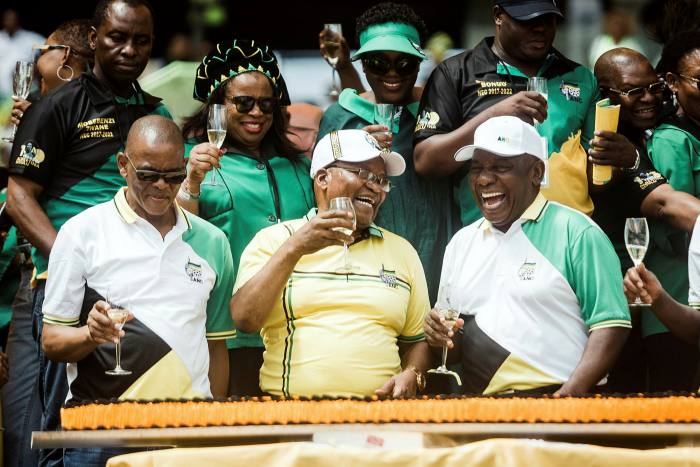Power outages, potholed roads and water shortages so frequent that hospitals are turning to boreholes have all become part of daily life in Johannesburg. Homelessness is now so high that many without shelter sleep each night in cemeteries.
The parlous state of what the ruling African National Congress calls “Africa’s world-class city” will take centre stage in South Africa’s nationwide local elections on Monday — a contest that sums up rising political discontent in the continent’s most industrialised nation.
The ANC is at risk of losing its tenuous grip on Johannesburg in the vote held just a few months after its poorest townships were caught up in the country’s worst public violence since apartheid.
While it would not be the first time the party had lost the city, defeat in Johannesburg would be a severe blow to President Cyril Ramaphosa’s attempts to address the wider malaise in the former liberation movement that has ruled South Africa since 1994.
“There is now a lot of disillusionment about what elections can actually do or change in people’s lives,” said Trevor Ngwane, spokesperson for the United Front, a civic group, and a resident of Johannesburg’s biggest township, Soweto. “They just want these people [politicians] to get on with the job on the ground.”
Johannesburg should have the resources to live up to its billing as the country’s economic engine. It drives 16 per cent of the nation’s economy, its upmarket business districts house several multinationals and it has some of Africa’s best internet infrastructure.
But its wealth hides a sputtering economy and what Growthpoint, South Africa’s biggest listed landlord, with major properties in the city, this month called “excessive increases in municipal rates and taxes over the past few years, combined with the deterioration of municipal service delivery”.

One of the biggest pressures stems from the thousands of people who arrive each month from even worse-off towns and rural areas of the country. Many settle on the margins of townships, adding more strain to infrastructure already in advanced decay. The city is more than R170bn ($11bn) behind on infrastructure spending already.
About a quarter of the reservoirs, pipes and other assets that keep water supplied to one of the biggest cities in the world without a major river or coastal access are due to reach the end of their operating lives within a decade, according to the local water company.
A large share of city revenues depend on electricity tariffs that are rising by double-digits even as outages worsen. Meanwhile, many residents are heading off-grid, hurting municipal coffers.
The ANC lost control of Johannesburg and other big South African cities to opposition parties in the last local elections, held in 2016 at the peak of the anger over perceived corruption under former president Jacob Zuma.
But it took Johannesburg back two years ago, after the collapse of a fragile pact to run the city led by the main opposition Democratic Alliance.
Control of eight major cities, including Johannesburg, is up for grabs in these elections, as well as almost 250 local councils and districts, using a combination of direct and proportional representation votes.
Johannesburg’s crumbling services should be political capital for the DA. It has campaigned on its success in governing elsewhere in South Africa, including towns such as Midvaal, a municipality south of Johannesburg.
But the party has been gripped by turmoil over its identity and splits that last year drove the formation of the breakaway ActionSA party led by Herman Mashaba, a former Johannesburg mayor.

“It’s true the DA has delivered better than the ANC,” said Dawie Scholtz, an independent election analyst. “[But] it means nothing for the [majority] of South Africans who don’t live in those areas.”
In Johannesburg, the DA would also face a difficult choice over coalition partners. Any pact with the ANC would be an “electoral disaster” in the next national poll, Scholtz said. But in a city where no party was likely to gain more than half the vote, there was “an enormous amount” riding on making a coalition work, he added.
“The harsh reality is that in a proportional representation system like South Africa, coalition politics is the future,” Scholtz said.
Sithembile Mbete, a political scientist at the University of Pretoria, added: “The politicians and parties don’t seem to have caught up to the realities of the electorate.”
Even as the Johannesburg vote points to a fragmented political future, Ngwane from the United Front said he was equally concerned about the social fissures being widened by frayed local services.
In the area of Soweto where he lives, one side of the street identifies as middle class and can buy solar panels and generators to make up for municipal collapse, while the poorer residents are stuck in dilapidated council housing.
“It will be an accident of where you were born, or where you live or work, that will ensure your access to basic services,” he said. “It doesn’t lead to any kind of social cohesion.”
For all the latest Business News Click Here
For the latest news and updates, follow us on Google News.
